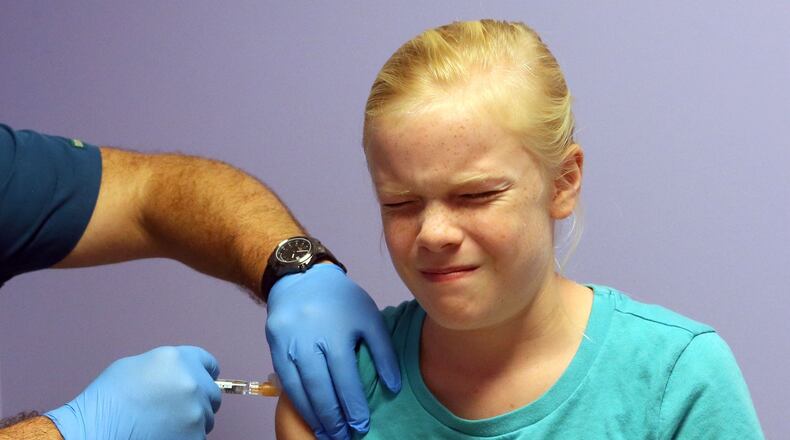Doctors say a contagious respiratory virus that has been filling hospital emergency rooms here and across the country since late spring is a stark reminder that flu season is coming and that parents should get their children and themselves vaccinated as soon as possible.
“It’s hard to predict what the flu season will be like, but it is extremely important that people get vaccinated as soon as possible, because it is likely that the flu and other winter respiratory viruses may circulate in large numbers at the same time,” said Dr. Andi Shane, medical director of epidemiology at Children’s Healthcare of Atlanta. “I would say that is the im portant and new angle on the flu this year — the concern that respiratory viruses are already in our community, so we should take flu season seriously and get vaccinated as soon as the flu vaccine is avail able in your community.”
Seasonal flu immunizations protect against the influenza viruses that research suggests will be the most common each year. Shane recommends that everyone 6 months of age and older get vaccinated.
Shane said that viruses such as enterovirus D68 cannot be treated with antibiotics, and there are no antiviral medicines for this family of viruses.
She said, “However, the seasonal flu, which we see every winter in Atlanta, can be prevented with very effective vaccines that are currently available and give families the best chance of preventing flu infections.”
Just as the new school year kicked into gear, record numbers of children were seeking care at Children’s Healthcare of Atlanta emergency rooms with respiratory symptoms.School-age children who were not known to be asthmatics had wheezing symptoms, and children who had a history of wheezing had more severe symptoms, Shane said in an email.
The bulk of those infections, she said, were likely due to the emerging enterovirus D68 that has also been seen in record numbers in more than 30 states.
“We saw a fourfold increase in children with respiratory viruses in the third and fourth weeks of August compared to July, which is uncommon,” Shane said. “We were seeing the same numbers of infections in August that we typically see in the winter months when flu and another respiratory virus, RSV, are circulating.”
She said the numbers of children with respiratory symptoms have thankfully been decreas ing over the past one to two weeks, but the hospital is preparing for an increase in winter respiratory virus infections as temperatures drop. While it’s not uncommon for several respiratory viruses to show up during Atlanta’s winter months, Shane said the flu is one that can be prevented with flu shots or nasal sprays.
“Respiratory illnesses like enterovirus D68 – for which we do not currently have vaccines — should remind us that we should get vaccinated against those infections that we can prevent, such as flu,” she said. “The sooner families are vaccinated, the greater the chance their immune system can fight it off when the flu hits.” According to the Centers for Disease Control and Prevention, the majority of children who were hospitalized during the 2012-2013 flu season were not vaccinated.
“While tactics like washing hands, covering your mouth and nose when coughing or sneezing, and limiting exposure to other ill persons can help, getting immunized against flu is the best thing that everyone can do to prevent infections from respiratory viruses,” Shane said.
She said children should see their pediatrician to get immunized against flu and to determine which vaccination is right for each family.
The start of the flu season varies from year to year but commonly peaks in the U.S. between December and February. The season, however, can begin as early as October and continue to occur as late as May.
Who's at greatest risk of the flu?
› Children age 2 and younger › Pregnant women of all ages › Anyone who is very overweight › Adults 65 years or older › Anyone with chronic health problems like asthma or diabetes › Anyone with immune system problems SOURCE: CHILDREN’S HEALTHCARE OF ATLANTA Go to MyAJC.com/living to find more details on this year’s flu shots and some changes in recommendations from the Centers for Disease Control and Prevention.
If you think your child has the flu:
› Keep your child at home. This reduces the spread of the flu to other family members, coworkers, students and the community. › Your child will be contagious a day or two before he feels sick. › Your child may return to school and activities once he has been fever-free for at least 24 hours without the use of fever-reducing medicine. SOURCE: CHILDREN’S HEALTHCARE OF ATLANTA
Common flu symptoms
- Chills
- Cough
- Fever
- Headache
- Loss of appetite
- Muscle aches
- Nausea, vomiting or diarrhea (mostly in children)
- Runny nose
- Sore throat
- Tiredness
SOURCE: CHILDREN’S HEALTHCARE OF ATLANTA
About the Author
Keep Reading
The Latest
Featured



